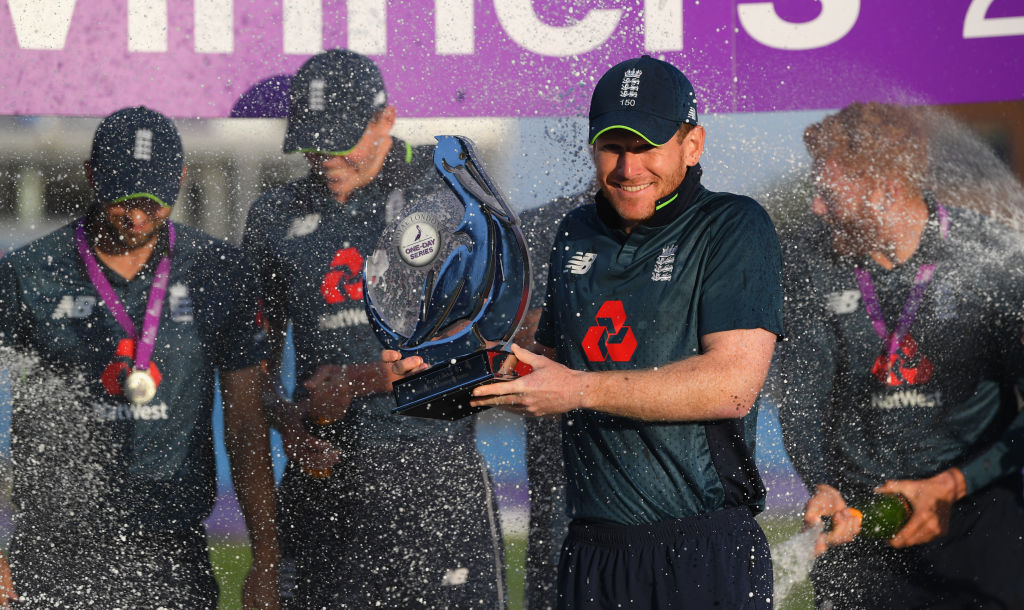I see no reason why England can’t win this World Cup, says ex-England star who terrorised Brian Lara

during 3rd ODI Royal London One Day match between England and India at Headingley on July 17, 2018 in Leeds, England.
By Richard Edwards
Chris Lewis knows just how painful World Cup disappointment can be. The former England all-rounder was just 24 when he was thrust onto the global stage at the 1992 tournament in Australia.
Lewis stood out in an England side that qualified for the final four of the competition in routine fashion, demolishing the likes of Australia and the West Indies en route.
The Guyanan-born quick gave a young Brian Lara a particularly torrid time at the MCG as England thrashed Richie Richardson’s side by six wickets, with Lewis taking 3-30 in eight of the most hostile overs bowled in the tournament.
After a win against South Africa in the semi-final – in farcical circumstances that ultimately led to the introduction of the Duckworth-Lewis system for rain-impacted run chases – Lewis then found himself handed a date with destiny against Pakistan.
“I was so young at the time that it was almost like things were just going on around me,” he tells The Cricket Paper. “Someone at Leicestershire once said to me that it’s so important that you take the time to smell the roses.
“But at that World Cup I’m not sure I did. I don’t think I really appreciated the enormity of what we had done until it was too late. It was only when I saw Pakistan’s players celebrating on the outfield that it hit home what we had missed out on.”
That remains England’s last appearance in a World Cup final and now Lewis, who turned 50 back in February, believes the time has come for a history of hard luck stories to be re-written.
Lewis knows a thing or two about the latter, having spent over six years in jail for drugs smuggling before his release in June 2015 – a painful period that he recounts with searing honesty in his autobiography, Crazy: My Road to Redemption.
Now, three years on from that release, Lewis is in a positive mood that reflects the general buoyancy of the nation, in a sporting sense at least, following England’s exploits at the football World Cup in Russia.
And he sees no reason why Eoin Morgan’s side can’t finally end a World Cup drought that dates back to 1975, when the World Cup is played here next summer.
“I love the way that this England side play – I absolutely love it,” he says. “It’s exciting stuff. I don’t think that many, if any, would have dreamt that you could go in to any game of cricket and literally hit every ball out of the park.
“Who would have dared to have dreamt that in our day? You just watch it and think, wow, what kind of mindset do you have to have to actually do that? Almost from ball one. It’s incredible.
“We were way short of that. If you were lucky enough to hit a four, we would take one the next ball, thank you very much.
“I see no reason why this England side can’t win the World Cup – and on home soil too, wouldn’t that just be fantastic? We could see kids out on the streets trying to be Alex Hales or Jason Roy or Joe Root. It would be brilliant.”
Lewis himself would have been tailor-made for the brand of cricket that England now play. Supremely gifted in all departments of the game, Lewis was also one of the finest fielders of his generation at a time when scant attention was paid to those skills.
“There has been an enormous jump in such a short space of time,” he says. “I marvel at these batsmen, I really do. But I also mourn for the bowlers. The last thing you need as a bowler is to have someone marching out to the wicket convinced that he can hit the ball out of the ground, pretty much regardless of the delivery you bowl.
“It’s a bowler’s nightmare but I would try to go out there and bowl as fast as I could. That’s what you want as a cricketer, you want the freedom to express yourself.”
His ‘disastrous mistake’ back in December 2009 cost him his own freedom. Now through work he’s carrying out with the Professional Cricketers’ Association (PCA), Lewis is hoping he can prevent others from making the same disastrous choices he made almost a decade ago.
And he, like England’s ODI side, is looking to a positive future.